The 51st Session of the Human Rights Council
12th September – 7th October 2022
Agenda Item 4: Human rights situations that require the Council’s attention
Interactive Dialogue on Oral Update of Commission of Inquiry on Syrian Arab Republic
22nd September 2022
By Sarah Tayara / GICJ
Executive Summary
On 22nd September 2022 at the 51st Regular Session of the Human Rights Council, the Commission of Inquiry on Syria held an Interactive Dialogue to deliver an oral update on the human rights situation in Syria.
After more than a decade of conflict, the people of Syria are living in a human rights tragedy. With humanitarian needs at their peak, and escalating violence, food insecurity and donor fatigue, Syrians are staring into an abyss of unimaginable pain and suffering.
Mr Paulo Sergio Pinheiro, Chair of the Commission, noted that despite a general reduction in fighting, the war is far from over. He condemned the acts of all parties in the conflict and highlighted that hostilities are intensifying on several fronts. Armed conflict is only one aspect of the hardships that Syrian civilians are facing. More than 12 million people have been displaced from their homes since March 2011. At least 400,000 have been killed. 14.6 million Syrians are dependent on humanitarian assistance. At least 150,000 are arbitrarily detained or forcibly disappeared at any one time, and 90% of the country is living below the poverty line.
In keeping with Syria’s rejection of the Commission’s mandate since its establishment in 2011, the Syrian delegate rejected the report, insisting that it is platform aimed at shaming the Syrian government and smearing it with unfounded allegations. He reiterated that the report contained prefabricated accusations which propagated a politicised agenda against Syria, aimed at undermining its territorial integrity. The delegates of Iran and Russia concurred with Syria’s statement and criticised the Commission’s encroachment on Syria’s sovereignty. Other delegations firmly condemned the ongoing violations committed against civilians by the Syrian authorities and other actors involved in the conflict.
Geneva International Centre for Justice (GICJ) welcomes the Commission’s update and condemns the abuse and suffering the people of Syria have endured for so long. GICJ urges all parties in the conflict to immediately cease all acts of violence against civilians. We are particularly concerned by the rise in arbitrary detentions and the deliberate withholding of information from family members on the whereabouts of their loves ones. Additionally, we call for the immediate cessation of blanket internment of children in al-Hawl camp.
After a decade of the world observing the suffering of the Syrian people from a distance, it is imperative that states make a real commitment to strengthen mechanisms of accountability and hold all parties in the conflict accountable for infringing upon the basic human rights of Syrian people. Maintaining the status quo is no longer an option. The time has come to finally put the interests of the Syrian people above the agendas of the parties in the conflict.
Background
In March 2011, Syrians peacefully took to the streets, calling for greater freedom and dignity following years of human rights abuses. The Syrian government swiftly opened fire on peaceful protestors, meeting their calls for justice with brutal repression. As the 12th year of the conflict looms, the human rights situation remains bleak. More than 12 million people have been displaced from their homes and at least 400,000 people have been killed, with the real number unknown and likely much higher. 90% of the country is living below the poverty line. Since 2011, the Commission of Inquiry on Syria, established by the Human Rights Council Resolution S-17/1, has produced 26 UN mandated reports documenting grave violations of the most fundamental human rights in the country. In its reports, the Commission relies on witness interviews, photographs, videos, and satellite imagery. Its efforts to carry out a full investigation remains curtailed, however, by the Syrian government denying the Commission access to the country.
Report Summary
The report, based on investigations between 1st January 2021 and 30th June 2022, highlights the devastating human rights situation in the country. In line with previous years, the report identified the Syrian government as the main perpetrator of human rights abuses in the country. Violations documented were wide ranging and siege tactics are still being used by pro-government forces against civilians. Horrific conditions in displacement camps in the north-west have forced many to return to their homes in frontline areas, exposing them to high risk of death due to active hostilities and indiscriminate civilian attacks. The Commission also highlighted that weaponisation of humanitarian aid is being used as a tactic of war, with pro-government forces blocking humanitarian aid from accessing civilians who are most in need.
Moreover, indiscriminate violence against civilians persists in the country. The report highlights the culpability of several parties to the conflict, including Hay’at Tahrir Al-sham (HTS), the Turkish Occupying Forces, the Syrian Democratic Forces and the Syrian National Army. Reflecting on the tragedy of the Syrian conflict in general, many children have been forced to bear the brunt of the attacks. The report also highlighted that torture and ill-treatment in detention centres operated by Syrian intelligence remained systematic. Across Syria, hundreds of thousands of civilians are unlawfully held in detention centres, forced to endure torture and inhumane and degrading treatment. The Syrian government also consistently fails to inform family members of the fate of their loved ones, relying on tactics of fear as a means of further repressing the population. Arbitrary detention as a means of punishment has also been relied upon by HTS in the north of the country.
The report also shed light on the worsening conditions for 60,000 people, of which 37,000 are children, in al-Hawl and al-Rawj displacement camps. Children and women experience daily violence, exploitation and abuse in conditions amounting to torture and inhumane or degrading treatment. With escalating murders and deadly clashes occurring in the camp, everyday survival is a struggle. Boys aged between 10 and 12 are regularly separated from their mothers, with some placed in military detention alongside alleged former Da’esh fighters, doomed to indefinite detention without legal recourse.
Furthermore, apart from some notable convictions in criminal proceedings in Europe, the Commission condemned the lack of comprehensive accountability for serious human rights violations and war crimes committed by the Syrian Government, armed groups, listed terrorist groups and foreign powers. It drew attention to the footage published on 27th April 2022 of executions by the Syrian Military Intelligence of at least 41 individuals in 2013 in Tadamon - a sharp reminder of the atrocities continuously committed throughout the conflict.
The report recommended the immediate cessation of all attacks on civilians as well as an independent, impartial, and credible investigation into civilian casualties to establish a system of accountability and non-repetition for perpetrators of crimes. Moreover, in light of the deteriorating living conditions, the Commission has called for a review of the sanctions currently imposed on Syria. Despite humanitarian exemptions, the report finds that more is required to mitigate unintended consequences on the daily lives of the civilian population brought about by over compliance. Additionally, the Commission called for an immediate end to all torture and other cruel, inhumane, or degrading treatment in detention centres as well as the implementation of all feasible measures in line with UNSCR Resolution 24/74 to locate all those arbitrarily detained. Importantly, it asserted that nothing less than a political solution brought about by a long-lasting, nationwide ceasefire will suffice.
Interactive Dialogue
Chair of the Commission - Mr Paulo Sergio Pinheiro
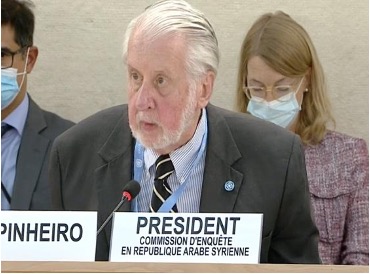 Mr Pinheiro, Chair of the Commission, opened the interactive dialogue by giving an oral update on the Commission’s findings. He noted that Syrians face increasing and intolerable hardships, living among the ruins of this lengthy conflict. Millions were suffering in displacement camps. Resources were becoming scarcer, donor fatigue was rising, and the deteriorating situation has been exacerbated by a cholera outbreak. He highlighted that the people of Syria have suffered through more than 11 years of crisis and conflict. Despite a general reduction in fighting, the war is far from over. Hostilities are intensifying on several fronts and armed conflict is only one aspect of the hardships that Syrian civilians are facing.
Mr Pinheiro, Chair of the Commission, opened the interactive dialogue by giving an oral update on the Commission’s findings. He noted that Syrians face increasing and intolerable hardships, living among the ruins of this lengthy conflict. Millions were suffering in displacement camps. Resources were becoming scarcer, donor fatigue was rising, and the deteriorating situation has been exacerbated by a cholera outbreak. He highlighted that the people of Syria have suffered through more than 11 years of crisis and conflict. Despite a general reduction in fighting, the war is far from over. Hostilities are intensifying on several fronts and armed conflict is only one aspect of the hardships that Syrian civilians are facing.
Mr Pinheiro lamented the deaths of over 400,000 civilians, the displacement of more than half of the pre-war population and the destruction of the country’s cities and infrastructure. He noted that all parties to the conflict have consistently failed in their obligations to allow and facilitate the unimpeded passage of humanitarian relief for civilians in need across Syria.
Mr Pinheiro discussed the state of more than 100,000 Syrian civilians who are missing or have been unlawfully detained. He stressed that torture and ill-treatment could be occurring at the same time as his address to the Council, and families of the disappeared could be paying bribes to State officials merely to receive fragments of information on the location of their loved ones. The risk of arbitrary detention, torture or enforced disappearance constantly looms over civilians.
Fundamental freedoms including freedom of movement, expression, association and peaceful assembly remain heavily restricted throughout the country. Referring to the government’s new decree on cyber crimes, Mr Pinheiro criticised the threat imposed on freedom of expression speaking out against the government
Mr Pinheiro moved on to recognise the heinous violations of other parties in the conflict. He condemned the attack on al-Sina’a prison in Hasakah city on 20 January 2022, highlighting it as a stark reminder of the threat still posed by Da’esh. He noted that Hay’at Tahrir al-Sham (HTS) enforced restrictions on media and press freedoms and interfered in the work of local organisations, including those working on gender-based violence. Members of the so-called Syrian National Army (SNA) also committed grave acts of torture, including sexual violence and ill-treatment in detention facilities under their control, with detainees dying as a result.
Mr Pinheiro continued by condemning the inhumane practices of torture and ill-treatment of those forcibly disappeared and arbitrarily detained, as well as the dire situation of the more than 60,000 detainees, including 37,000 children, in the Al-Hol and Al-Rawj camp. Finally he concluded by imploring the international community not to look away from Syria. Now, more than ever, the Syrian people await our response.
Syria
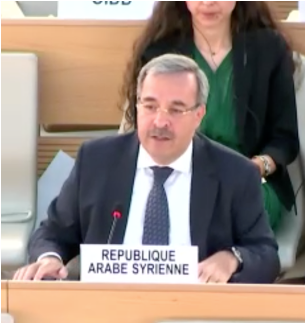 Mr Hussam Edin Aala, the representative of Syria, began by renewing Syria’s rejection of the Commission’s mandate and its biased reports. He accused the Commission of prefabricated allegations which overlook the root causes of the crisis. Mr Alaa reiterated Syria’s efforts to restore and consolidate security and stability in the country. However, he noted that Syria’s efforts are challenged by the Turkish, Israeli and US occupation of parts of its territory. He further reminded the Council of its responsibility to monitor and document crimes of Turkish occupation and hold them accountable. He continued by denouncing the effect of the Universal Coercive Measures and the American plundering of oil, gas and wheat.
Mr Hussam Edin Aala, the representative of Syria, began by renewing Syria’s rejection of the Commission’s mandate and its biased reports. He accused the Commission of prefabricated allegations which overlook the root causes of the crisis. Mr Alaa reiterated Syria’s efforts to restore and consolidate security and stability in the country. However, he noted that Syria’s efforts are challenged by the Turkish, Israeli and US occupation of parts of its territory. He further reminded the Council of its responsibility to monitor and document crimes of Turkish occupation and hold them accountable. He continued by denouncing the effect of the Universal Coercive Measures and the American plundering of oil, gas and wheat.
Finally, he finished by underlining that the Commission’s reports are filled with unfounded accusations and fallacies. He renewed his call for the Council to end the Commission’s politicised mandate which lacks credibility and objectivity, and poses a threat to Syria’s national sovereignty and territorial integrity.
Condemning the Syrian Government
Many States then took the floor to express their views on the Commission’s update and put questions before Mr Pinheiro and members of the Commission: Mr Hanny Megally and Ms Lynn Welchman.
The representative of Lithuania delivered a statement on behalf of a Nordic-Baltic Countries. The representative expressed firm support for the work of the Commission. He lamented the dire human rights and humanitarian situation in Syria which is exacerbated by attacks on civilians by the Syrian regime and its allies such as Russia. The representative joined the Commission in urging all countries to refrain from providing military aid to government forces and other actors in the Syrian conflict who continue to commit war crimes against the Syrian people.
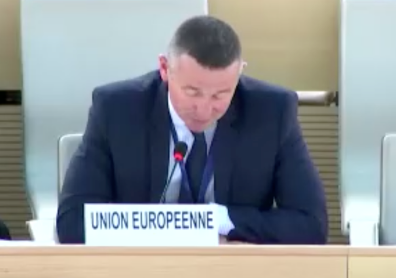 The representative of the European Union began by highlighting the EU’s continued support of the Commission. He condemned the persistent and systematic violation of human rights and humanitarian law by all parties in the conflict, particularly by the Syrian regime. The representative reiterated the EU’s commitment to fighting impunity through mechanisms such as the International, Impartial, Independent Mechanism (IIIM) and reporting cases to the International Criminal Court. He noted that Syria is not a safe place to return to, highlighting the EU’s concern regarding social and demographic engineering in the country.
The representative of the European Union began by highlighting the EU’s continued support of the Commission. He condemned the persistent and systematic violation of human rights and humanitarian law by all parties in the conflict, particularly by the Syrian regime. The representative reiterated the EU’s commitment to fighting impunity through mechanisms such as the International, Impartial, Independent Mechanism (IIIM) and reporting cases to the International Criminal Court. He noted that Syria is not a safe place to return to, highlighting the EU’s concern regarding social and demographic engineering in the country.
The delegate of Qatar condemned the Syrian regime’s deliberate use of enforced disappearances and arbitrary detentions as a weapon of war. She deplored the deliberate targeting of women and children, as well as the seizing of civilian property and houses. In support of the Secretary-General, she called for an enquiry to determine the fate of thousands of disappeared persons, urging the international community to put more pressure on the Syrian government to put an end to impunity.
The representatives of Germany, the United Kingdom, France and Greece, aligned themselves with the statement made by the EU. They reiterated that Syrians are being subjected to a staggering level of displacement and humanitarian needs. The country is nowhere near to being safe. The representatives discussed the proliferation of torture and sexual violence in detention facilities, urging full access be given to the International Committee of the Red Cross into detention facilities. The representatives reiterated that the regime must cease holding the political situation hostage and must genuinely commit to a political solution. There cannot be any lasting peace without justice.
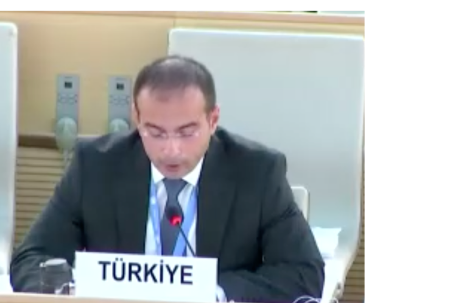 The representative of Turkey highlighted that a prosperous, safe Syria built on the aspirations of its people can only be achieved via a political process in line with Security Council Resolution 22/54. He asserted that perpetrators of grave violations such as the Tadamon massacres should be held accountable. He highlighted the threat to Syria’s territorial integrity, asserting that the international community should not remain silent about the separatist agenda committed by terrorist organisations. He categorically rejected all allegations made against Turkey in the report and concluded by denouncing the representative of Syria’s accusations, deeming them “not even worth a reply”.
The representative of Turkey highlighted that a prosperous, safe Syria built on the aspirations of its people can only be achieved via a political process in line with Security Council Resolution 22/54. He asserted that perpetrators of grave violations such as the Tadamon massacres should be held accountable. He highlighted the threat to Syria’s territorial integrity, asserting that the international community should not remain silent about the separatist agenda committed by terrorist organisations. He categorically rejected all allegations made against Turkey in the report and concluded by denouncing the representative of Syria’s accusations, deeming them “not even worth a reply”.
Criticising the Commission’s Politicised Agenda
Some States criticised the Commission, accusing it of pursuing a politicised agenda aimed at manipulating the Human Rights Council. They highlighted that UNSCR 46/22, which established the Commission, had not actually been supported by Syria as the concerned country, hence rendering its findings unacceptable and biased.
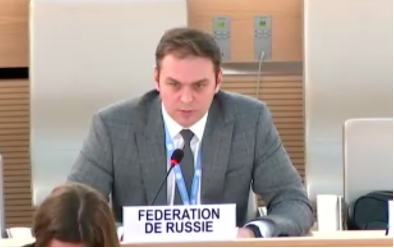 The representative of Russia noted with regret the lack of improvement in the human rights situation in Syria. He deplored the Unilateral Coercive Measures imposed on Syria by Western countries to serve their geopolitical interests. He criticised the United Nation’s leadership for ignoring the appeals of Damascus regarding the looting of its natural resources and a violation of the UN charter, accusing it of playing into the West’s agenda of ensuring any political settlement serves their own needs.
The representative of Russia noted with regret the lack of improvement in the human rights situation in Syria. He deplored the Unilateral Coercive Measures imposed on Syria by Western countries to serve their geopolitical interests. He criticised the United Nation’s leadership for ignoring the appeals of Damascus regarding the looting of its natural resources and a violation of the UN charter, accusing it of playing into the West’s agenda of ensuring any political settlement serves their own needs.
The representative of Iran criticised the report’s lack of objectivity and balance in its approach. He condemned the looting of Syrian oil and crops, and asserted that the foreign occupation has prolonged the conflict and suffering of the Syrian people. The representative reiterated that Syria’s sovereignty and its effort to provide security to its civilians must be recognised.
Civil society representatives
The overwhelming stances of NGOs was clear and homogenous. The culpability of the Syrian authorities in the persisting human rights violations of the Syrian people is undeniable. Civil society organisations called for the imposition of international sanctions on armed groups and parties proven to be involved in human rights violations. The civil society organisations called for the establishment of an IIM to locate those missing. Moreover, they explored the deplorable situation of women’s and child rights, highlighting that their vulnerability often means that they are disproportionately impacted by the harsh realities of war.
GICJ Position
Geneva International Centre for Justice (GICJ) welcomes the Commission’s update and condemns the abuse and suffering the people of Syria have endured for so long. GICJ urges all parties in the conflict to immediately cease all acts of violence against civilians. We join the Commission in calling upon an immediate end to inhumane treatment and torture in detention centres, including sexual and gender-based violence, as well as an immediate release of all arbitrarily detained civilians. We also call upon the immediate cessation of all arbitrary internment of children in al-Hawl camp. In a war which has inflicted unbelievable pain on children, blanket internment represents yet another way in which children have been forced to bear the brunt of the Syrian conflict.
After a decade of the world observing Syrian suffering from afar, it is imperative that governments make a real commitment to strengthen mechanisms of accountability and hold all parties in the conflict accountable for infringing upon the basic human rights of Syrian people. We join the Commission’s outrage at the Security Council’s discussions on closing the final humanitarian aid border. Maintaining the status quo is no longer an option. The time has come to finally put the interests of the Syrian people above the agendas of the parties in the conflict.
International Humanitarian Law, Geneva International Centre for Justice, GICJ, Justice, Syria, Commission of Inquiry Syria, Human Rights, Human Rights Council, HRC51, Syrian Conflict, Syrian War, Syrian Suffering, Geneva4Justice




